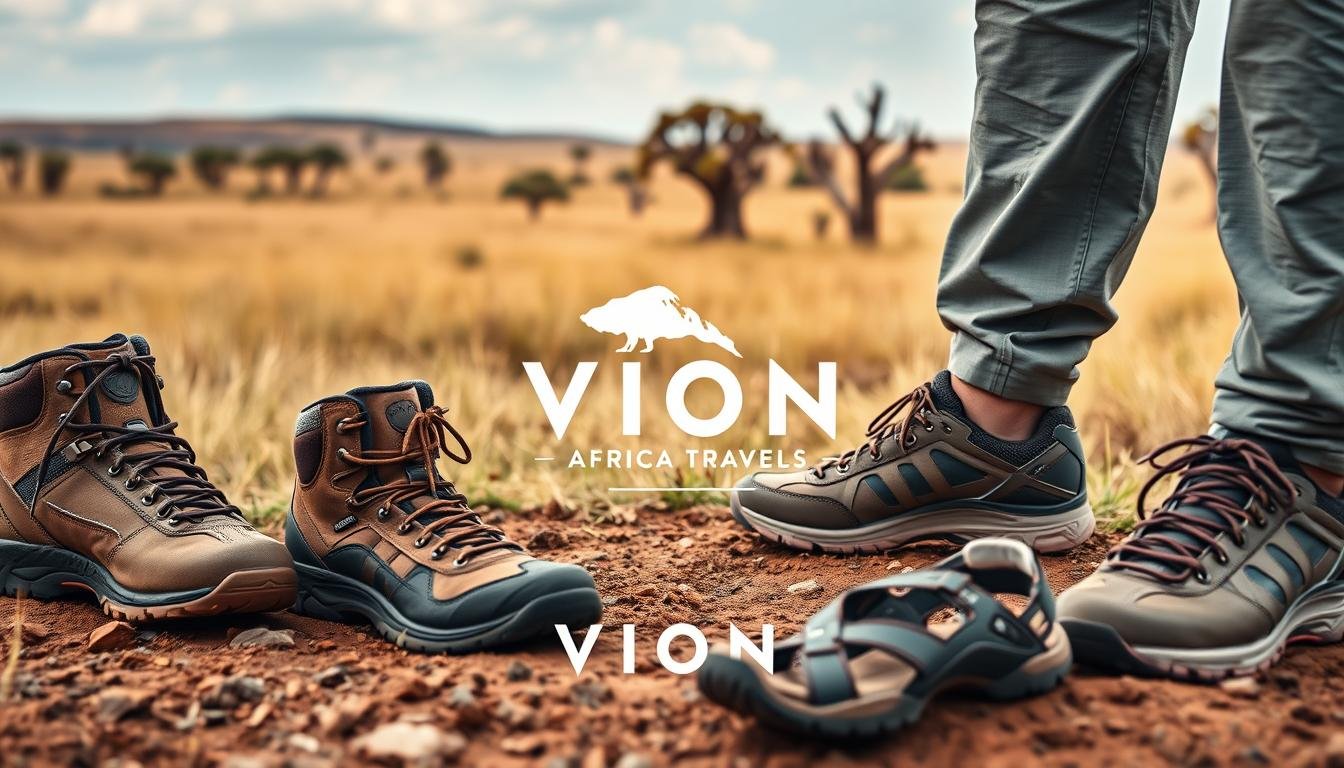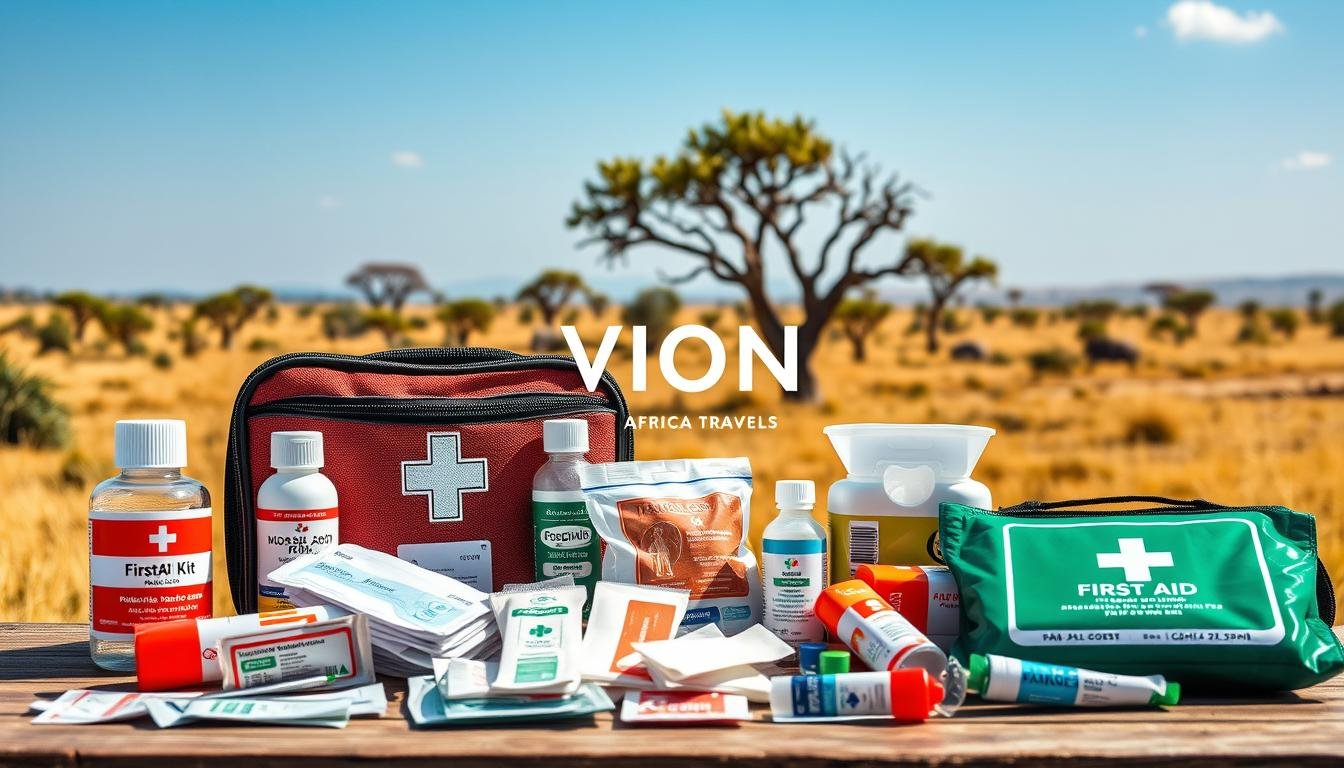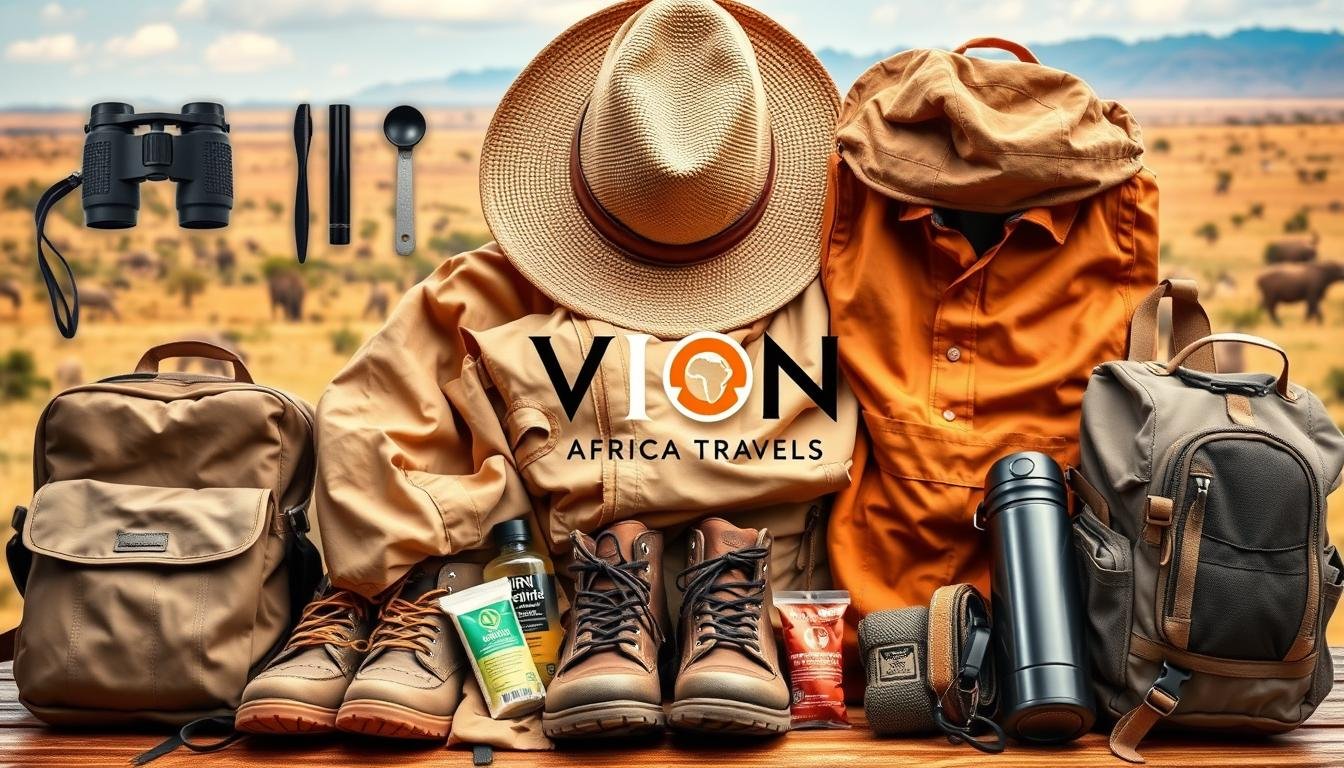Going on a safari in Tanzania is a dream for many. It’s important to pack the right things for a comfortable trip. We’ll cover everything you need, from clothes and shoes to special gear for seeing wildlife and staying safe.
Key Takeaways
- Familiarize yourself with the local climate and terrain to pack accordingly.
- Invest in lightweight, breathable, and neutral-toned clothing for optimal comfort.
- Bring essential accessories like hats, sunglasses, and scarves to protect against the elements.
- Equip yourself with binoculars, a camera, and other essential gear for wildlife viewing.
- Prepare a well-stocked first aid kit and pack necessary medications for your safety.
Overview of Safari Gear
Going on a Tanzania safari means you need the right gear for a good time. It’s important to pick the best equipment and know how the weather affects what you pack. This guide will help you get ready for your adventure.
Importance of Choosing the Right Equipment
The gear you choose for your safari is key to a great trip. Good, durable, and useful equipment makes a big difference. It helps you enjoy Tanzania’s amazing nature more.
How Local Climate Affects Our Packing List
Tanzania’s weather varies a lot, from hot near the coast to cooler in the north. Knowing the weather helps you pack right. This way, you’ll be comfortable and ready for anything Tanzania throws your way.
| Climate Zone | Average Temperatures | Precipitation | Recommended Gear |
|---|---|---|---|
| Coastal Region | Warm and humid, with temperatures ranging from 75°F (24°C) to 90°F (32°C) | Moderate rainfall, especially during the rainy seasons | Lightweight, breathable fabrics, sun protection, and rain gear |
| Northern Highlands | Cooler temperatures, with highs around 70°F (21°C) and lows near 50°F (10°C) | Moderate rainfall, with distinct wet and dry seasons | Layered clothing, warm jackets, and sturdy footwear |
| Central Plateau | Warm and dry, with temperatures ranging from 80°F (27°C) to 95°F (35°C) | Low rainfall, with a pronounced dry season | Lightweight, breathable fabrics, sun protection, and hydration essentials |
Knowing Tanzania’s different climates helps us pack better. This way, we’re ready to enjoy the safari and all its wonders.
Clothing Essentials for Tanzania Safaris
When you go on a safari in Tanzania, it’s important to pack the right clothes. You want to be comfortable and enjoy your trip. Choose lightweight, breathable fabrics that can handle different temperatures and conditions.
Lightweight and Breathable Fabrics
The African weather is hot and humid. So, pick fabrics that keep you cool and dry. Cotton, linen, and synthetic blends that wick moisture are great for your [tanzania safari clothing]. They’ll keep you comfy all day, whether you’re driving or walking.
Neutral Colors in Our Wardrobe
For [tanzania safari clothing], stick to neutral colors like khaki, beige, olive, and tan. These colors blend with nature, helping you see wildlife without scaring them. Avoid bright or bold colors that might attract unwanted attention.
Layering for Temperature Changes
The temperature in Tanzania changes a lot during the day. Pack layers to adjust to the weather. Start with a light base layer, add a sweater or jacket for cooler times, and have a warm outer layer like a fleece or windbreaker.
By thinking about these tips, you’ll be ready for your Tanzania safari. Choose clothes that are comfy, practical, and versatile. They should keep you cool, protected, and ready to enjoy the African scenery.
| Fabric Type | Advantages | Considerations |
|---|---|---|
| Cotton | Breathable, soft, and comfortable | May not dry as quickly in humid conditions |
| Linen | Lightweight, airy, and moisture-wicking | Can wrinkle more easily |
| Synthetic Blends | Quick-drying and moisture-wicking | May not be as breathable as natural fibers |
“Packing the right [tanzania safari clothing] is essential for a comfortable and successful safari experience. By focusing on lightweight, breathable fabrics and neutral colors, you’ll be well-equipped to explore the stunning landscapes of Tanzania.”
Remember, the key to packing for a Tanzania safari is to choose versatile and practical [tanzania safari essentials] that will keep you comfortable and ready to fully immerse yourself in the beauty of the African wilderness.
Footwear Recommendations
Going on a safari in Tanzania means you need the right shoes. They should be comfy and safe. You’ll walk on uneven paths and explore beautiful landscapes.
Comfortable Hiking Boots
First, get a good pair of hiking boots. They’re key for walking on rough paths and grassy plains. Choose boots with strong ankle support, a tough sole, and breathable materials. This keeps your feet cool and dry all day.
Sandals or Flip-Flops for Relaxation
Don’t forget to pack sandals or flip-flops for when you’re not hiking. They’re light and let your feet breathe. They’re perfect for walking around the camp or by the pool.
Having the right shoes is crucial for a great safari. With hiking boots and sandals, you’re ready for Tanzania’s varied landscapes and weather.
Packing the Right Accessories
When we go on a Tanzania safari, it’s key to pack the right stuff. This ensures we’re comfy and safe on our adventure. We need hats and sunglasses to protect us from the sun. Scarves or buffs help keep dust off our faces.
Hats and Sunglasses for Sun Protection
The sun in Tanzania can be very strong, especially at midday. To keep our skin and eyes safe, we should bring wide-brimmed hats and sunglasses with UV protection. These items will protect us from the sun and make our safari more enjoyable.
Scarves or Buffs for Dust Control
The rough terrain and open-air drives in Tanzania can stir up a lot of dust. This dust can be a problem, irritating our eyes and breathing. A lightweight, breathable scarf or buff is a must-have. It helps us cover our faces and breathe easier during dusty parts of the safari.
By choosing and packing the right tanzania safari accessories, we make our safari better. We’re ready for the unique challenges of this amazing adventure.
Essential Gear for Wildlife Viewing
Going on a tanzania safari means you need the right gear for an amazing time. We’ll look at the key items like binoculars and camera equipment. These tools can make your safari unforgettable and help you capture special moments.
Binoculars: A Must-Have Tool
Binoculars are a must for any safari lover. They let us see wildlife up close without disturbing them. A good pair of binoculars can help us spot and watch animals better.
Camera Equipment for Capturing Memories
Many people want to capture the beauty of tanzania’s wildlife. Whether you’re a pro or just use your phone, the right camera gear is key. DSLR cameras or high-quality phones can help you save those incredible moments.
Guided Tour vs. Self-Drive Considerations
Travelers can choose between a guided tour or a self-drive safari in tanzania. Guided tours offer expert knowledge and access to remote spots. Self-drive safaris give you freedom to explore on your own. Think about what you prefer to decide.
| Guided Tour | Self-Drive Safari |
|---|---|
| Expert-led knowledge | Greater flexibility |
| Better access to remote areas | Opportunity to explore off-road |
| Seamless, organized experience | Sense of adventure and independence |
With the right tanzania safari gear and knowledge, we can have a deep and rewarding safari experience.
First Aid Kit Essentials
Going on a tanzania safari means we need to be ready for anything. Packing a good first aid kit is key. It helps keep us safe and healthy as we see amazing sights and animals.
Common Injuries and How to Prepare
Minor cuts and blisters to serious injuries, we need to be ready. Our first aid kit should have bandages, antiseptic wipes, and gauze pads. We also need adhesive tape, tweezers, and scissors for cuts and bruises.
Insect repellent and creams for itching are also important. They help prevent and treat problems from bugs.
Medication for Malaria and Other Risks
Malaria is a big worry on a tanzania safari. We must talk to our doctor about antimalarial meds. We should take them before, during, and after our trip.
We might also need meds for altitude sickness, diarrhea, and other travel sicknesses. Being prepared helps us enjoy the safari without worrying about health issues.
With a good first aid kit and health care in mind, we can enjoy the tanzania safari fully. We’ll be ready for any medical needs that come up.
Personal Hygiene Items
When you go on a tanzania safari, keeping clean is key. You’ll need eco-friendly toiletries and essentials like hand sanitizers and wet wipes. We’ve got everything you need.
Eco-Friendly Toiletries
Choose biodegradable toiletries to protect the environment. Look for shampoos, soaps, and personal care items without harsh chemicals. They should also be in sustainable packaging. This is good for the planet and your skin.
Hand Sanitizers and Wet Wipes
It’s important to keep your hands clean on a tanzania safari. Bring travel-sized hand sanitizers and biodegradable wet wipes. They’re perfect for quick clean-ups when water is scarce. They help you stay healthy and avoid getting sick.
| Personal Hygiene Item | Recommended Products |
|---|---|
| Eco-Friendly Shampoo | Burt’s Bees Natural Shampoo, Dr. Bronner’s Castile Soap |
| Biodegradable Soap | Dr. Bronner’s Castile Bar Soap, Puracy Natural Bar Soap |
| Hand Sanitizer | EO Organic Hand Sanitizer, Tom’s of Maine Natural Hand Sanitizer |
| Biodegradable Wipes | Seventh Generation Compostable Wipes, Eco-Friendly Baby Wipes |
With the right personal hygiene items, you can stay clean and comfortable on your tanzania safari. Plus, you’ll be kind to the environment.
Food and Hydration
When we go on a tanzania safari, eating right and drinking enough water are key. We’ll explore Tanzania’s beautiful landscapes. It’s important to bring good snacks and drink plenty of water.
Snacks to Bring on Our Safari
It’s vital to pack healthy snacks to keep our energy up. Here are some good choices:
- Energy bars or granola bars for a quick boost
- Dried fruits and nuts for a balanced mix of carbohydrates and protein
- Jerky or biltong for a savory, protein-rich treat
- Trail mixes that combine various nuts, seeds, and dried fruits
- Crackers or pita chips with hummus or nut butter for a satisfying snack
Importance of Staying Hydrated
Drinking enough water is crucial on a tanzania safari. The African weather can be very hot and dry. Dehydration can cause tiredness, headaches, and other health problems.
Bring a refillable water bottle or hydration pack. This way, you always have clean water. Also, pack drinks that replace lost minerals, like sports drinks or electrolyte tablets.
“Staying hydrated is the key to a successful and comfortable safari experience.”
By choosing the right snacks and drinking plenty of water, we’ll have lots of energy. This lets us enjoy all the amazing sights of Tanzania’s wilderness.
Technology and Communication
Going on a safari in Tanzania means having the right tech and communication tools. These help us stay connected and capture amazing moments. We’ll look at the key gear and accessories for a great safari experience.
Mobile Phones and Connectivity Options
It’s important to stay in touch during our safari. Whether for emergencies or sharing our adventures, we need to be connected. Even in remote areas, we can use local SIM cards and Wi-Fi at lodges to stay in touch.
Power Banks and Charging Solutions
Keeping our devices charged can be tough in the wild. To avoid dead batteries, we’ll bring tanzania safari gear like power banks. These let us charge on the move, so we can capture and share our safari moments.
“Staying connected and powered up is essential for a seamless and memorable tanzania safari experience.”
With the right tanzania safari gear and accessories, we can enjoy the wildlife and landscapes. Our safari will be filled with unforgettable experiences.
Safari Insurance and Documentation
Planning a safari in Tanzania is more than just packing. We must also think about our safety and legal needs. This includes travel insurance and the documentation needed to enter the country.
Importance of Travel Insurance
Even with careful planning, surprises can happen on a safari. Travel insurance can help with medical issues or accidents. It gives us peace of mind and protects our finances.
Choosing a good insurance policy means our tanzania safari travel tips and tanzania safari essentials are covered.
Required Documents for Entry
To enter Tanzania for a safari, we need certain documents. A valid passport is a must, and sometimes a tourist visa is required. Knowing the tanzania safari travel tips and tanzania safari essentials about entry will help us start our trip smoothly.
- Valid passport with at least six months of remaining validity
- Tourist visa (obtained in advance or upon arrival)
- Proof of yellow fever vaccination (if required)
- Travel insurance documentation
By focusing on travel insurance and the right documents, we can enjoy our tanzania safari more. These steps are key to a safe and memorable trip.
Currency and Budgeting
Going on a tanzania safari means knowing the local money and budgeting well. It’s key to handle money exchange and use cash versus cards wisely. This can greatly affect your safari trip.
Local Currency and Conversion Tips
The official money in Tanzania is the Tanzanian Shilling (TZS). It’s smart to carry both cash and cards for different needs during your safari. Learn the current exchange rate and know the local money types before you go.
Many places on safari accept major credit cards. But, having cash for small buys, tips, and surprises is a good idea. Tell your bank and credit card companies about your trip to avoid card problems.
Handling Cash vs. Credit Cards
For a good safari, mix cash and cards. Use cash for tips, local buys, and small costs. Credit cards are best for big payments like safari packages and flights.
Carry small local money amounts for easy spending. Also, watch out for fees from money exchanges or card use. These can add up fast on your safari.
| Payment Method | Advantages | Disadvantages |
|---|---|---|
| Cash (Tanzanian Shilling) |
|
|
| Credit/Debit Cards |
|
|
Knowing the local money and using both cash and cards can make your safari finances smooth. This way, you can enjoy your tanzania safari travel tips and tanzania safari essentials without money worries.
Cultural Considerations
As we start our tanzania safari journey, knowing the local customs is key. It makes our trip more meaningful and respectful. We’ll learn about dress code, gift-giving, and more to blend in with the locals.
Respectful Dress and Behavior
In Tanzania, dressing modestly is crucial. Choose lightweight, breathable clothes that cover your shoulders and knees. Stick to neutral colors like khaki, olive, and beige to fit in with nature.
Our actions should also show respect for the culture. Refrain from public displays of affection. Be quiet and considerate, especially in sacred places or when meeting locals.
Cultural Gift Etiquette
Gift-giving is a big deal in Tanzania. It shows you care and appreciate the culture. Bring unique items from your country, like souvenirs, local crafts, or non-perishable foods.
When giving a gift, use both hands and smile. Don’t give something too expensive. It might be seen as too flashy or rude.
By following these cultural tips, our safari will be unforgettable and respectful. We’ll make a positive impact on the local communities we meet.
Weather Considerations
Planning a safari in Tanzania means knowing the weather. It affects our packing and the trip. Knowing the best time to visit and preparing for different seasons is key. This way, we can have a great safari experience.
Ideal Time to Visit and Its Impact on Packing
The best time for a safari is during the dry seasons. These are from June to October and January to February. The weather is mild, and there’s less rain. This makes it easier to see animals and enjoy the outdoors.
Our packing list should include lightweight, breathable clothes. These are perfect for the warm, dry weather.
Preparing for Rainy and Dry Seasons
- Rainy Season (March to May, November to December): Expect heavy rain, especially during the “long rains” from March to May. We should pack waterproof layers like rain jackets and ponchos to stay dry.
- Dry Season (June to October, January to February): This season has little rain and cooler temperatures. It’s the best time for a safari. We should pack breathable, lightweight clothes for the sunny, dry weather.
Understanding Tanzania’s weather and packing right ensures a great safari. With the right gear, we can enjoy our trip, rain or shine. Tanzania is a place where unforgettable memories are made.
Planning for Photography
Going on a Tanzania safari means you want to capture amazing wildlife and landscapes. To get stunning photos, planning your camera gear and approach is key. Let’s look at what you need for your Tanzania safari photos.
Types of Cameras to Bring
The camera you pick for your safari depends on your style and skill. For wildlife, a DSLR or mirrorless with a strong telephoto lens is best. These cameras take high-quality photos and let you capture animals from far away. Tanzania safari gear should also include a small camera or smartphone for quick shots.
Tips for Wildlife Photography
- Get to know your camera before you go. This way, you’ll feel comfortable using it in the wild.
- Use a tripod or monopod for a steady shot, especially with long lenses.
- Be patient and watch for the perfect shot. Wildlife can surprise you, so be ready.
- Try different angles and views to make your photos interesting.
- Always respect the animals and their homes. Follow your guide’s rules for responsible photography.
By planning your camera and techniques, you’ll be ready to capture Tanzania’s beauty. You’ll make memories that last a lifetime.
Safeguarding Our Valuables
Going on a safari in Tanzania is an amazing adventure. But, we must keep our valuables safe. This means protecting our personal items and important documents.
Secure Storage Options
There are many ways to keep our valuables safe on a Tanzania safari. One good option is a high-quality, tamper-resistant travel safe. These small devices can hold passports, cash, and jewelry safely. Many safari lodges also have in-room safes or safety deposit boxes for extra protection.
Best Practices for Keeping Items Safe
Using secure storage is just part of the solution. We should also follow some best practices. First, don’t show off our valuables or leave them alone, especially in crowded places. When we’re out exploring, keep our bags close and use bags that are hard to steal from. Always be aware of our surroundings. It’s also smart to make copies of important documents and keep them in a safe place.
By following these tips, we can enjoy our tanzania safari essentials without worry. Our precious items will stay safe during our adventure in Tanzania.
Final Packing Checklist
Our Tanzania safari is getting closer, and it’s time to check our packing list. We want to make sure we have everything we need. This final checklist will help us stay organized and ready for the fun ahead.
Last-Minute Items We Shouldn’t Forget
Even though we’ve got the basics covered, there are a few things we should add. Personal medications, chargers for our devices, and any needed adaptors or converters are must-haves. Also, remember to pack any special items or souvenirs you want to bring back.
How to Organize Our Gear Efficiently
Keeping our safari gear organized is key to a great trip. We suggest packing in smaller, labeled bags or cubes. This makes everything easy to find and keeps things neat. It’s also smart to keep important items like medications and documents separate and safe.



